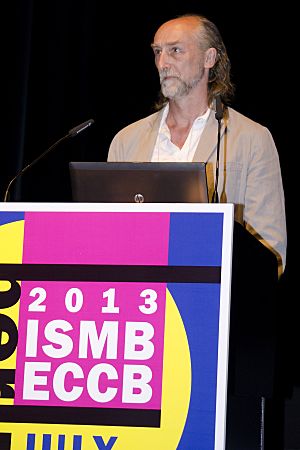Alfonso Valencia facts for kids
Quick facts for kids
Alfonso Valencia
|
|
|---|---|

Alfonso Valencia speaking at ISMB/ECCB 2013.
|
|
| Alma mater |
|
| Known for | BioCreative |
| Awards |
|
| Scientific career | |
| Fields |
|
| Institutions |
|
| Academic advisors | Chris Sander |
Alfonso Valencia is a Spanish scientist who studies biology. He is a professor at ICREA and leads the Life Sciences department at the Barcelona Supercomputing Center. He also directs the Spanish National Bioinformatics Institute (INB-ISCIII).
Professor Valencia helps coordinate a big project called IMPaCT. This project focuses on "Personalised Medicine" in Spain. From 2015 to 2018, he was the President of the International Society for Computational Biology.
His work involves creating new ways to use computers to solve problems in biology and medicine. He has developed special computer methods. These methods help with things like finding information in biological texts. They also help understand how proteins change over time. His work even helps map out how diseases are connected in the body.
More recently, he has been working on "digital twins" of cells. These are like virtual models of cells. He also works with international groups that study cancer. He helped start the ELIXIR project, which is a big data network for life sciences. He also founded Spanish and international groups for bioinformatics. Bioinformatics is a field that combines biology with computer science.
Contents
Becoming a Scientist
Alfonso Valencia studied biology at the Complutense University of Madrid. He learned about how groups of living things change over time. He also studied biophysics, which is about how physics applies to living things.
In 1987, he visited the American Red Cross Laboratory. He earned his PhD in molecular biology in 1988. This degree was from the Autonomous University of Madrid.
From 1989 to 1994, he worked at the European Molecular Biology Laboratory (EMBL). This lab is in Heidelberg, Germany. There, he worked with a scientist named Chris Sander. They studied how proteins change and develop. They used information from protein sequences and structures.
Understanding Proteins with Computers
In 1994, Alfonso Valencia was a main author on an important paper. This paper talked about "correlated mutations" in proteins. Imagine two parts of a protein that always change together. This paper showed that if these parts change together, they might be close to each other in the protein's 3D shape.
This idea helped scientists predict the shapes of proteins. Knowing a protein's shape is very important. It helps us understand how it works. This method became very useful in the 2010s. It even helped with the success of DeepMind's AlphaFold 2 program in 2020. AlphaFold 2 is a computer program that can predict protein shapes very accurately.
What He Researches
In 1994, Valencia started the Protein Design Group. This group was at the Spanish National Center for Biotechnology (CNB). Later, he led the Structural and Computational Biology Group at CNIO. In 2006, he became the Director of the Structural Biology and Biocomputing programme at the Spanish National Cancer Research Center (CNIO).
Since 2016, he has been an ICREA Professor. He also directs the Life Sciences Department at the Barcelona Supercomputing Center (BSC).
As a computational biologist, he tries to understand how biological systems work. This includes studying cancer and other diseases. He uses a mix of bioinformatics, network biology, and machine learning. Machine learning is a type of artificial intelligence.
His team has created computer systems for many areas. These include predicting protein structures and how proteins interact. They also work on systems biology, which looks at how all parts of a biological system work together. They use computers to find information in texts and data. This work helps with studying cancer and how different diseases might be linked.
All his work helps with "Personalised Medicine." This is about tailoring medical treatments to each person. He is especially interested in how artificial intelligence and powerful computers can help with this.
As of 2024, Professor Valencia has published over 450 scientific papers. These papers have been mentioned by other scientists more than 92,000 times. His work has appeared in many top scientific journals.
Awards and Recognition
In 2024, Alfonso Valencia was named a Corresponding Member of the Academy of Medicine of Zaragoza, Spain. He also became a Research Professor at the CNB in 2005.
He was one of the first members of the International Society for Computational Biology (ISCB). In 2010, he was honored as an ISCB Fellow. He also served as ISCB Vice President. From 2015 to 2018, he was the President of the ISCB.
Valencia is also a Doctor Honoris Causa from the Danish DTU. He is a member of the European Molecular Biology Organization (EMBO).
He works with several international groups. These include Genecode / ENCODE and the International Cancer Genome Consortium. He also works with groups studying rare diseases and epigenomics.
Valencia directs the Spanish National Bioinformatics Institute. This institute is part of the ISCIII. It is also the Spanish hub for European Life-sciences Infrastructure for Biological Information (ELIXIR).
He is currently a co-executive editor for the journal Bioinformatics. He is also on the editorial boards of other scientific journals.
See also
 In Spanish: Alfonso Valencia para niños
In Spanish: Alfonso Valencia para niños
 | Valerie Thomas |
 | Frederick McKinley Jones |
 | George Edward Alcorn Jr. |
 | Thomas Mensah |

